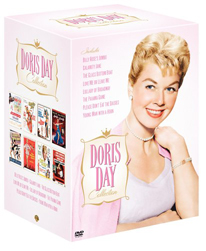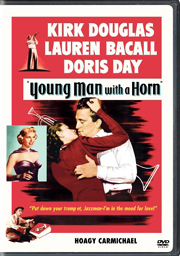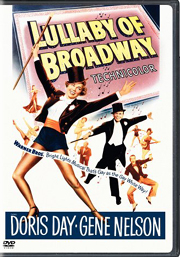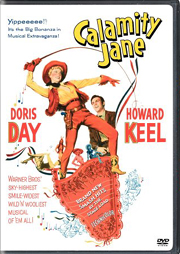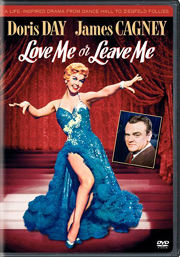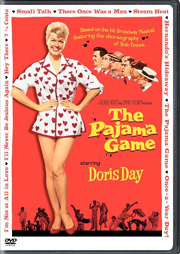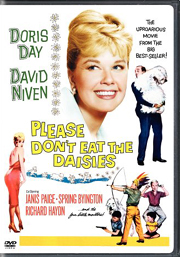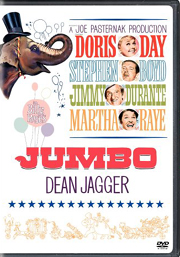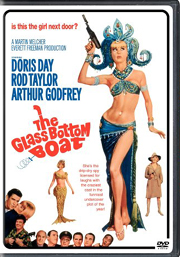| Release List | Reviews | Price Search | Shop | Newsletter | Forum | DVD Giveaways | Blu-Ray/ HD DVD | Advertise |
| Reviews & Columns |
|
Reviews DVD TV on DVD Blu-ray International DVDs Theatrical Reviews by Studio Video Games Features Collector Series DVDs Easter Egg Database Interviews DVD Talk TV DVD Talk Radio Feature Articles Columns Anime Talk DVD Savant HD Talk Horror DVDs Silent DVD
|
DVD Talk Forum |
|
|
| Resources |
|
DVD Price Search Customer Service #'s RCE Info Links |
|
Columns
|
 |
The Doris Day Collection
|
||||
Warners' rather large Doris Day boxed set reminds me of giant CD collections of her recordings I've seen in music stores - huge boxes of treasures with steep price tags. This carefully-chosen film selection represents every stage of Day's musical career, including her top titles as a band singer- turned favorite show girl. There are even a couple of late-career oddities that have been hard to see for quite a while.
|
||||
Michael Curtiz directed Day in several of her less-memorable Warners musicals, but in the noirish Young Man with a Horn she is given what could be called a featured supporting role, standing just outside the film's central romance. Said to be based roughly on the life of a self-destructive jazz musician, the story features Harry James playing for Kirk Douglas'es tortured trumpet whiz.
Young Man with a Horn has its melodramatic moments - a forgotten friend is even run over by a car - but its solid story of the price of artistic ambition is later echoed in Martin Scorsese's New York, New York. Kirk Douglas is excellent as the trumpeteer blinded to everything except his art. Sweet-faced Day inadvertently introduces him to Lauren Bacall's incompatible vixen Amy North, a complex character that causes him no end of trouble. Amy decides to return to law school after marrying Martin, but she's incapable of concentrating her energies on any one thing and prefers to move on to new interests and sensations. Martin dumbly wants the kind of wifely loyalty that Jo's character could provide, while Amy calmly introduces him to the young female painter with whom she is obviously having an affair. Mainstream dramas around this time were flirting with lesbian characters (Nightmare Alley, All About Eve) but writers Carl Foreman and Edmund H. North have no trouble presenting Amy's choice of companion as her cruel way of tormenting the emotionally needy Martin. Day shows up at the twenty-minute mark and makes a strong impression, even though the picture is slanted toward Lauren Bacall's character. Hoagy Carmichael's laconic sidekick is pleasant support and Juano Hernandez's fine performance takes the edge off of the "wise black artist mentors white aspirant" subplot. Although Douglas is seen stumbling in a drunken stupor through New York locations, UCLA's Janss Steps and Royce Hall stand in for an Eastern college and a hospital interior! Young Man with a Horn is presented in an excellent transfer that reproduces the crisp B&W of Warners' films around this time. The musical arrangements revisit many standards made popular in earlier studio films: Moanin' Low from Key Largo, and a number of Warren-Dubin songs from Busby Berkeley musicals. The only extra is a trailer gallery that has precisely two trailers, including one for Young Man with a Horn.
|
||||
Doris Day started her career in a number of Warners musicals, often co-billed with the talented but miscast Jack Carson. Some of them play like MGM-wannabe's with Day stuck in a permanent smiley-faced mode, sparring with movie stars in lame cameos, dancing with animated characters, and so forth. Lullaby of Broadway is a good choice for this set. It pairs Day with amiable dancer Gene Nelson (Will Parker in the film version of Oklahoma! and later television director) and has some snappy songs to recommend it, even if there are no stand-out numbers. The forgettable story seems partly purloined from Lady for a Day with Doris returning from Europe to find some loyal servants inventing a fiction to make her think that her mother, now a singer in a cheap beer joint (Gladys George of The Roaring Twenties), is still a Broadway headliner. In keeping with the light-comedy atmosphere, George's alcoholic collapse and internment in a sanitarium is all ellipsed. She emerges from the clinic neatly dressed and made-up, with a new hairstyle! S.Z. Sakall, Billy DeWolfe and Ann Triola all work overtime to sell some so-so comedy relief, and matron Florence Bates is rather cruelly used as the butt of many jokes. Carlo and Constance De Matiazzi provide an impressive novelty dance number with a surprise finish. Day sings the title tune with almost exactly the same arrangement used for the incomparable Winifred Shaw in The Golddiggers of 1935. Day's disembodied face appears as a growing dot in a dark frame, just as in Busby Berkeley's original. But the number then becomes an unexceptional straight dancing and singing affair. Lullaby of Broadway on DVD looks great; the Technicolor is perfectly aligned in all but a couple of brief cuts. The color adds to the appeal, although Day is clearly wearing heavy makeup to erase her freckles. The lone extra this time is a poster gallery with a number of titles, including the anti-Klu Klux Klan thriller Storm Warning. The cover poster illustration sells Day in an Eleanor Powell pose. She dances well enough, but you wouldn't say it's her calling in life.
|
||||
For the record, this boxed set's disc of Calamity Jane is a repackaging of an earlier snapper-case release with the same menus, extras, etc. Savant's review of that earlier disc (2002) can be found here.
|
||||
The most-demanded title in the collection is this superior early CinemaScope musical bio featuring Day as Ruth Etting, a real-life singer from the 1920s who got her start as the consort of a gangster, Martin Snyder. Under assured direction from Charles Vidor, Day strikes tense sparks as an ambitious singer clearly playing a dangerous game with James Cagney's unscrupulous and unstable "manager."
Although tame by today's standards Love Me or Leave Me succeeds as a tense drama, a musical biography and a musical in its own right. Musical bios often have serious problems (or are downright phony) but this one makes for compelling viewing. Ruth Etting may be tormented by the crude Snyder but she can't deny that she's taking full advantage of his career 'guidance.' Marty is surprised to discover that audiences actually like Etting's voice and that he no longer needs to pay them to applaud. Viewers expecting more Doris Day apple-pie entertainment may have been disturbed by the adult complexities in Daniel Fuchs and Isobel Lennart's script, but they must have enjoyed the many excellent musical numbers, a big step up from most of her previous work. Shaking the Blues Away is a stylish highlight that shows Day fully in command of the show. Of special note is Cameron Mitchell as the other man in Etting's life. The versatile actor played a lot more than just second-string bad guys during the early Hollywood portion of his career, and he's both sensitive and restrained here. And how many actors can claim to have been shot out of jealousy in a movie with Jimmy Cagney? James Cagney reins in his psychotic Cody Jarrod image but still threatens to explode in many scenes. His frustrated hood defines importance by the number of people who dance to his tune. The only story gear-change that the film flubs is the abrupt marriage scene ... it's unclear why Etting gives in, especially after her revulsion at Martin's clumsy attempts to kiss her. Films in 1955 just weren't allowed to touch on sexual reality. In any rational reading of the situation, Etting had probably been sleeping with Marty since near the beginning, and sexual compatibility may have been the only functioning part of their relationship. This kind of sordid tension points the way to later dysfunctional 'romances' in films by Martin Scorsese. Love Me or Leave Me looks terrific on DVD, mastered in enhanced widescreen and remixed in DD 5.0. The movie was once noted for having serious "CinemaScope mumps" problems - the early 'Scope lenses squashed faces horizontally in close-up - but I didn't notice the effect at all in this viewing. Did Warners alleviate the problem by carefully re-squeezing certain shots? The extras are more thorough this time around. Two early Vitaphone short subjects show the real Ruth Etting singing and acting in a style with little similarity to Day's. A third extra is a lengthy exhibitor's promo touting upcoming 1955 product, with a number of stars talking to the camera. We see Charles Vidor and his cast briefly on the set of this film. A trailer is included as well.
|
||||
Possibly Doris Day's best film, The Pajama Game is a delightful George Abbott musical directed by Stanley Donen. In 1956 the lavish but static Rodgers and Hammerstein adaptations were probably more popular, but those pictures have started to creak while Day's vehicle is still as funny as it is musically memorable. The songs are all keepers: Hey There, Hernando's Hideaway, There Once Was a Man are just three. A great stage cast socks them over with gusto. Doris Day is the only movie star among them but she quickly proves that she can carry the show, and then some.
Back in the days when the unionization of companies wasn't considered a bad thing (before Hoffa?) The Pajama Game wasn't discussed much from a labor-management point of view - the Sleep Tite company is organized like a cottage workshop from the turn of the century and its sewing machines are operated by American hands earning an honest living. Who could complain? The plot does revolve around a set of cooked books, the key to which is guarded by the front-office sexpot Gladys Hotchkiss (Carol Haney, late of Kiss Me Kate) the same way she guards her virginity: Not very well. The Sleep Tite company is something of a social Utopia, with eyebrow-raising employees like Mabel (Reta Shaw) and Poopsie (perennial bimbo Barbara Nichols) poking their way into Babe Williams' business. Jealous ex- knife thrower Vernon Hines (Eddie Foy, Jr.) tries to keep the staff in line, but they're uncontrollable, and not just at the Once-a-Year Day picnic bash. It turns out that hard-nosed overseer Sid is on the side of fairness after all. He helps gets the goods on the stingy Mr. Hasler by plying Gladys with liquor at Hernando's Hideaway, the local joint used by everyone for forbidden liasons. The Pajama Game is a catalogue of unique musical delights. It respects the dignity of people who don't look like movie stars. The hefty Reta Shaw becomes as light as a feather in a dance duet with Eddie Foy Jr.. Carol Haney must overact wildly to appear awkward, but becomes a tango fiend in the fileroom at the first sign of a male tease. When Day and boom-voiced John Raitt sing together, they convince as two conventional people in work clothes, cavorting with their sleeves rolled up. Both the choreography and the camera blocking bring The Pajama Game into comparison with the follow-up Abbott/Donen film Damn Yankees, especially because both feature career-defining choreography by Bob Fosse. Steam Heat with Carol Haney as the main attraction loosely equates with Who's Got the Pain? in the second film. Doris Day is not really a star dancer, so spreading the performing opportunities around helps everything work out for the best. There's a sense of freedom and creativity in the athletic Once-a-Year Day, and clever cartoonish trickery in Hernando's Hideaway ... "Where's Poopsie?" The Pajama Game is the kind of film that best suits Doris Day's personality. It's like visual Benzedrine, overflowing with enthusiasm. Unlike some of her other vehicles, there's no need for Day to tone down her 'stand up and yell' spirit. The show has wit and funny characters that collectively give it a sentimental appeal; there's little room for the tears found in parts of Damn Yankees. The exuberant 4th of July in this film makes an interesting comparison with the slightly cynical Labor Day in Picnic - they're two mood takes of the same kind of feeling. The Pajama Game on DVD is a reprinting of an earlier disc from 1999, which was a good enhanced transfer that will probably become the subject of special edition makeover, unless it comes out in some HD format first. There's a second encoding of a full frame (boo!) version on the flipside, and the same extras as well: A trailer and the cut song The Man Who Invented Love which was replaced at the 11th hour with a reprise of Hey There.
|
||||
This amusing light comedy puts Day in a credible family situation. The reasonably witty script comes from a book by Jean Kerr, wife and collaborator of noted theater critic Walter Kerr. Although the issues are simplified the show does capture the dilemma of being a critic -- critics offend and terrorize performers and can become too enamored of their own cynical jokes. The cure in this case is humility. David Niven's critic realizes that although he can pass judgment on the plays of others, he himself was a miserable failure as a dramatist. At one point, Doris Day's character talks happily of being a homemaker and her unconcern that 'important' people don't want to know or talk to homemakers. It's not a conservative message -- we can tell that she means it. Partly produced by her husband Martin Melcher, we know this is a movie Day believes in.
Doris Day fights the good fight as a Manhattan mother of four, comes to hate her upwardly mobile husband's new cocktail party millieu and builds a new country home seventy miles up the Hudson. The script iindulges jokes both domestic (a neurotic dog) and professional (Janis Page's predatory actress) but Day expertly anchors her character in real feelings. Kate MacKay impressed audiences as someone who might live next door, only a little sexier. Print ads billed Kate's four boys as The Monsters, and they're a nicely-chosen group. Charles Herbert (The Fly) and Stanley Livingston (My Three Sons) are joined by Flip Mark and a toddler with an engaging personality. Spring Byington is okay as Grandma and Patsy Kelly (Rosemary's Baby) figures in as a spry babysitter. What with a cage for the youngest and a pet store figuring in the plot, there's a lot of child-animal comparison going on here. Anybody with children, however, is going to be chilled by the shot of the tiniest tot perched over the street on a high balcony, sitting behind bars he could easily slip right through. Nowadays, everything seems a threat; 1959-60 must have been a much more stable era, psychologically speaking. David Niven is able to maintain a modicum of dignity even while having to get laughs by catching a sheep dog or falling through a rotten floorboard. One fine scene has Lawrence assess his feelings after being slapped in public by an irate actress. Unlike most urban comedies of the time, no emphasis is given to drinking liquor -- but at one point David Niven does pop an animal tranquilizer! Vincent Price took the first movie L.S.D. trip earlier in the season, in The Tingler. But Niven on PCP? ... get out the tazer guns and billy clubs. One gets the idea that Day was probably close pals with mankiller Janis Paige (her costar in Romance on the High Seas) and might have secretly liked to play a true bad girl herself someday. After Love Me or Leave Me she probably realized that her best bet was to stick fairly close to her basic goody-goody character. Thus the frisky twinkle in Day's eye remained just a twinkle. She would retire from films only eight years later, having earned enough money to kiss all the grief goodbye. Director Charles Walters keeps the whole thing moving, especially in the difficult early scenes when he has so many child actors to wrangle. When Day asks for a kiss from her boys, they keel over in a coordinated cadence that Walters must have timed out to dance counts. Please Don't Eat the Daisies looks fine in enhanced widescreen and has better color than the television prints Savant has been used to seeing. Day sings the title song in a playground and a bit of another at a play rehearsal, giving the clear tracks a workout. In an inside joke, she also sings a bit of Que Será, Será from The Man Who Knew Too Much and ad libs about running away with Rock Hudson. The only extra is a trailer.
|
||||
Circus movies are, well, circus movies, and with few exceptions (such as Trapeze) tend to rate fairly low on the list of really good movies. That doesn't mean they can't be fun, as there are good times to be had in parts of everything from The Greatest Show on Earth to Circus of Horrors. Billy Rose's Jumbo is an adaptation of an ancient Broadway play that attempts to turn a circus movie into a three-ring musical extravaganza. Doris Day is once again a virginal princess of pep holding a bankrupt show together with enthusiasm and talent -- she appears to perform most of the acts personally! The Sally of the Sawdust-- style plot has Jimmy Durante in a W.C. Fields role as the irresponsible Pop Wonder, forever gambling away the show's operating funds. His comic foil is Martha Raye's Lulu, a palm reader. All three of them double as clowns and are frequently "doubled" by good impersonators when doing high-wire acts. One routine with Durante looks rather dangerous. At his age it would seem very easy to break a hip, or worse. The non-existent storyline has Day's Kitty tending to the circus while perfectly made-up and coiffed, and falling in love with a roving roustabout (Stephen Boyd) who turns out to be a sneaky spy from the competition. His father, rascally John Noble (Dean Jagger) originally only wanted the Wonder Circus'es star attraction, a tremendous and talented elephant named Jumbo. Now his son is helping him to take over the whole show. Circus movies are also usually padded with featured acts that can be edited with audience reaction shots with satisfactory results. Jumbo barely acknowledges an audience and plays to the viewer instead. Director Charles Walters takes pains to coordinate a lot of action on screen, often in unbroken cuts, and special performance sequences were directed by Busby Berkeley. It's all bright and colorful yet suffers from its realistic approach. The movie is a fantasy but most of the performances are fairly naturalistic, with only the pros subbing for the stars amounting to a cheat. Savant is not a fully-educated musical expert but recognized only one lasting ballad, The Most Beautiful Girl in the World. Day sells her frequent songs well and Durante is amusing, but the ugly-mug treatment given Martha Raye isn't all that appealing. With a circus full of clowns we don't need such an exaggerated leading player. And Stephen Boyd is the odd star out, so handsome and brooding he doesn't seem to be in the same movie. He introduces the show in a solo on a stage proscenium, but evokes little of the magic of the circus. Circus movies also seem to be somehow tied to The Great Depression -- they're always about spirit and teamwork overcoming economic disaster. In this story, the heroes lose their show and spend the last half hour in depressing vignettes playing off the back of a single wagon. Little attention is given to their prospective audiences while the stars play to the camera -- there's no Circus Spirit here, only vaudeville ham antics. If you want Circus Spirit, watch the modest little show put on by the performers in Wings of Desire: the real magic is the joy on the faces of the little kids. By the way, the bona fide star of the show is the rather large title pachyderm. It wears a top hat and tie for some numbers and goes through an entire, impressive routine without a cut. Jumbo in general earns our applause, even though activists would assure us that the Circus is no life for a sweet-tempered animal like the elephant. Jumbo also provides the film's solitary big laugh. Jimmy Durante is caught red-handed trying to sneak off with the colossal beast, that overflows the screen in three directions: "Where are you going with that elephant?" Durante stiffens, leans back against Jumbo's leg and says, "What elephant?" Billy Rose's Jumbo is beautifully restored on DVD and has a four-minute overture reattached for the first time since it was new. It's been remixed in 5.1. The extras include an old Tom & Jerry cartoon involving a lost elephant from the circus, and a curious musical short called Yours Sincerely that must be connected to Jumbo in some way I couldn't figure out. It features a very early rendition of the standard With a Song in My Heart.
|
||||
This beached whale of a star vehicle for Doris Day is going to be loved only by fans of kitsch and followers of Frank Tashlin, a comic director with a body of work that reads better in uppity film criticism than it plays on the screen. The cornball antics update MGM's simple sex farces (the kind written by George Wells for Debbie Reynolds and Shirley MacLaine) into the space-race years, with fashionable nods to hi-tech research and spy films. Writer-coproducer Everett Freeman's script tosses a few misunderstandings into a tall stack of cold-war hijinks and comes up with a story in which Tashlin's tiresome physical slapstick feels right at home. The saving grace is Day, along with some of her lively supporting cast. Behind mid-sixties eye makeup that disguises crow's feet but also her natural personality (see the Catalina Island featurette), Day must work all the harder to project the old fresh-faced charm. Her character is a widow, an idea established just to cover the obvious notion that she's too old to act quite so virginal. In The Glass Bottom Boat she doesn't act virginal - it's just that bad slapstick and tasteless gags keep cropping up to foil her bedroom plans with straight man Rod Taylor.
A lot of cornball entertainment from the 60s has been rediscovered, including Doris Day's often clever sex comedies with Rock Hudson. But when Hollywood reacted to the Beatles and James Bond by trying to be hip and trendy, they made several years' worth of embarrassing comedies. The Glass Bottom Boat is fairly entertaining but still the kind of spectacle one stares at rather than laughs with ... every attempt to be wacky and camp pretty much falls flat on its face. The script loads the story with hi-tech schtick. Day (or rather, her double) visits a rocket assembly plant, while rear projection lets her witness space capsule testing and the notorious Rocketdyne test lab up in Simi Valley. Tashlin milks the millieu for non-existent comedy gags -- the then- fairly new concept of the Clean Room, for instance. The rest of the futurism is borrowed from Tashlin's 1930s cartoons - a remote controlled speedboat (funn-nee!) and a robot vacuum that sprints out of a cupboard every time someone drops anything on the floor. At least ten minutes are used up while poor Day tries to be Laurel & Hardy put together, tangling with ladders and ashtrays or kissing the wrong man because of a mixup in the dark. There's little point in belaboring a script that thinks it's fun for a busy executive to assign a girl to a fake job for the purposes of seduction. Because Rod Taylor has brains, boats, helicopters and a Mulholland Drive super-pad that rivals the house in Forbidden Planet, it's a given that Day will naturally want to hop in bed with him. The spy plot is silly sub-Batman stuff with bozo CIA agents and bozo Kremlin spies unable to figure out the innocent Jennifer's supposed espionage plans. She's surrounded by a mostly emasculated group of fuddy-duddies. John McGiver is underused, Dom DeLuise is an infantile agent, Paul Lynde a fussy security man, Edward Andrews a foolish general and Dick Martin an oversexed executive. Lynde goes in drag in search of cross-dressing jokes that never appear and Martin and Andrews end up in bed together for a lame gay joke. The Glass Bottom Boat got many repeat network showings after Rowan and Martin's Laugh-In became a huge TV hit a couple of years later. Alice Pearce and George Tobias provide sitcom laughs as Day's next-door neighbors, and Arthur Godfrey collected a paycheck for just showing up and making older folks feel more comfortable. In the show's only reassuring plot twist, the trusted CIA man turns out to be an impostor and Godfrey binds and gags two other snoopy G-Men just on basic principle. For a side cameo, Robert Vaughn appears momentarily as Napoleon Solo of The Man From U.N.C.L.E., complete with his original theme music. But don't get any ideas about The Glass Bottom Boat being a vehicle of subversion. As soon as Day gets one of the real spies to confess, she insists that the right thing for him to do is go to the authorities and "name names." The Glass Bottom Boat is another winner on DVD, with a snappy transfer and good audio (even for the title tune, which is credited to Joe Lubin even though it's practically identical to The Mockingbird Song. Oh, and Day does yet another short reprise of Que Será, Será. Three promotional featurettes are included as extras. Godfrey narrates one on Catalina, and one about NASA shows every bit of the film's faked 'research' footage while a distracted Doris recites some facts about the Apollo program. By the look of the architecture, exteriors of Rod Taylor's space facility is one of the just-completed campuses of the University of California. A third featurette is co-sponsored by the Cotton industry and features a "Miss Cotton" walking around the rotting sets on MGM's backlot while a narrator tells us they are in daily use. Doris Day appears to be having a fine time shooting costume tests for the film. Besides a rather painful trailer, we're given the Oscar-winning 1965 cartoon The Dot and the Line, directed by Frank Tashlin's old Looney Tunes cohort Chuck Jones. There's not much more to say about the star appeal of Doris Day ... she's a refreshing reminder of a time when fame and celebrity were still attached to real performing talent. Warner's boxed set will appeal to a great many musical movie fans. On a scale of Excellent, Good, Fair, and Poor,
|
||||
|
|
||||
|
|
||||
|
|
||||
|
Reviewed: April 23, 2005
Review Staff | About DVD Talk | Newsletter Subscribe | Join DVD Talk Forum |
|
| Release List | Reviews | Price Search | Shop | SUBSCRIBE | Forum | DVD Giveaways | Blu-Ray/ HD DVD | Advertise |






